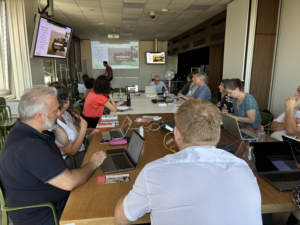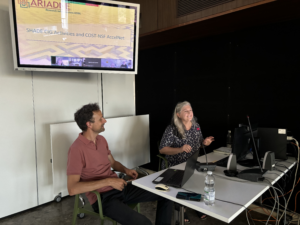
Julian Richards presenting the Portal updates
The 3rd ARIADNE RI General Assembly was held at the National Library (ICCU) in Rome (and via Zoom) on Friday 30th August 2024 – ten years after the very first ARIADNE meeting in the same place!
Franco Niccolucci welcomed everyone and announced that the Catalogue had surpassed 4m records and ARIADNE was now attracting additional important institutions such as the Swedish School at Rome, the Digital Repository of Ireland and the Swiss Institute of Archaeology among others.
Julian Richards went on to describe the latest and future updates to the Portal. These include three more collections: records of messages in bottles (from shipwrecked sailors from the 18th-19th centuries), sonar wreck surveys from the Irish Seas (IMARDIS from the University of Bangor) and the first digital records to link to ‘analogue’ shelf references from the University of Portsmouth. Later in the year, enhanced records from AIS-CR of the Czech Republic would be added. Several new datasets are also in the pipeline, which cover north Africa, fieldwork surveys and reports from Ireland and Switzerland plus data from Athens and Rome. Julian then went on to describe the planned enhancements to the Portal which include a new country filter, new data types (e.g. GIS, IIIF) and integration of IIIF and 3D-HOP viewers.
Sheena Bassett followed with an update on the dissemination activities. Thanks to the SHADE CIG two new videos have been produced along with a poster and leaflets. In addition, the main SHADE deliverable is the ARIADNE RI Business Plan which covers the next four years of activities – everything is looking financially sound with the research funding enabling steady growth along with enhancements of the Portal.

Holly Wright at the ARIADNE GA
Holly Wright mentioned some further SHADE highlights, the Training School on data aggregation and integration held in Crete in June and a national workshop organised in Greece in May. SHADE will also be represented on a joint panel at the UN Assembly Science Summit in September in New York. Finally, ARIADNE are also involved in a new COST Action, Managing Artificial Intelligence in Archaeology (MAIA) via ADS.
Claudio Prandoni then went on to talk about the ATRIUM and ECHOES projects. He provided overviews of each project, their objectives and the role of ARIADNE in each. Franco added an update about the ARTEMIS project which concerns ‘heritage digital twins’.
The final item on the Agenda was the Activity Plan for 2025. At present, it is proposed to set up some Working Groups. These would cover the use of AI in archaeology and more work on 3D and further suggestions from the members was welcome.

